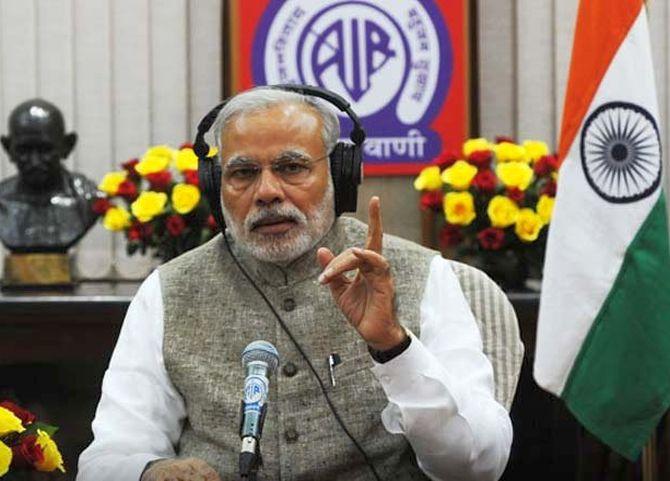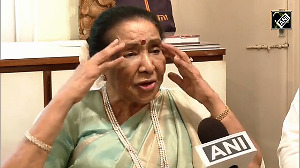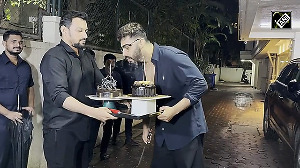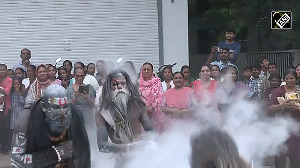 Prime Minister Narendra Modi said on Sunday that he deliberately kept 'politics' out of his monthly radio address 'Mann ki Baat' as the programme was about the aspirations of the people and not his or the government's achievements.
Prime Minister Narendra Modi said on Sunday that he deliberately kept 'politics' out of his monthly radio address 'Mann ki Baat' as the programme was about the aspirations of the people and not his or the government's achievements.
He also said he chose radio as a medium to connect with the people as it was a 'mighty means' of getting across.
Addressing the 50th episode of the programme, he said the 'apprehensions' of the people are not 'misplaced' that the programme could have been used as a political tool and to disseminate his and his government's achievements.
"The fact is, if a leader gets hold of a microphone with assured listeners to the tune of millions, what else does he need? ... When 'Mann Ki Baat' commenced, I had firmly decided that it would carry nothing political, or any praise for the government, nor Modi for that matter anywhere. The greatest bulwark in ensuring adherence to my resolve have been you," he said.
As a run up to each episode, the expectations and aspirations of listeners through their letters, online comments and phone calls are crystal clear, he said.
"Modi may come and go, but this country will never let go of its unity and permanence, our culture will always be immortal," the prime minister said.
He said in an era of social media, he preferred radio as he realised its potential in 1998 as a worker of the Bharatiya Janata Party (BJP).
In a remote Himachal Pradesh area, it was a tea stall owner who broke him the news of India carrying out nuclear test.
"It was matter of great intrigue to me to see a lone tea seller in a remote, snow-clad hilly place, who possibly kept listening to the radio the entire day… watching that particular effect of the news on radio led me to realise and internalise that this was a medium that was truly connected with the masses… and that it was a mighty means of getting across," Modi said.
In terms of the reach and depth of communication, radio has been incomparable. I have been nursing that feeling ever since, acknowledging its power and strength. Hence when I became the prime minister, it was natural for me to turn towards a strong, effective medium, he pointed out.
Modi's monthly radio broadcast 'Mann ki Baat' completed 50 episodes on Sunday.
In its previous episodes, he has covered issues of social, national as well as international implication: education of the girl child, tackling exam stress, climate change and drug menace.
In October 2014, in the very first episode of the programme, he had urged citizens to use at least one khadi product, saying it would help poor weavers.
On Sunday, Modi expressed concern over a 'decline' in open communication between elders and youths in families, saying the discussions generally revolve around dos and dont's and studies.
He said communication would be more effective if people 'accept' instead of 'expect' and 'discuss' instead of 'dismiss'.
The prime minister also urged people to maintain a balance between rights and duties as enshrined in the Constitution.
"If we respect the rights of others, our rights will automatically get protected and similarly if we fulfil our duties, then also our rights will get automatically protected," he said.
"Today's youth will not do anything which they do not believe themselves. And whenever they believe in something, they follow that, leaving everything else," he said.
Referring to a 'communication gap' between the elders and teenagers in families, he said the scope of discussion with teenagers was limited to studies, habits or lifestyle and the 'dos and don'ts'.
"An open discussion without any expectations is gradually on the decline and this too is a matter of concern... Communication will be more effective if we 'accept' instead of 'expect' and 'discuss' instead of 'dismiss'," he said.
He said he tries to learn from whatever youth are doing or whatever they are thinking.
"Some people say that the youth do not have patience but my belief is that the youth do not have any time to waste. This is the point which helps the present day youth become more innovative because they want to accomplish things quickly," he said.
Referring to the Constitution Day being observed on Monday to mark its adoption in 1949, he said the extraordinary pace at which the document was drafted was an example of time management and productivity to emulate even today.
"This also inspires us to accomplish our responsibilities within a record time," the prime minister said.
He said the unique point in the Constitution was that the rights and duties were very comprehensively detailed.
"A balance between these two in the lives of our citizens will take our nation forward. If we respect the rights of others, our rights will automatically get protected and similarly if we fulfill our duties, then also our rights will get automatically protected," Modi said.
The prime minister also recalled the contribution of B R Ambedkar whose death anniversary falls on December 6.
"I, on behalf of all countrymen, pay my homage to Baba Saheb who gave the right to live with dignity to crores of Indians. Democracy was embedded deep in Baba Saheb's nature and he used to say that India's democratic values have not been imported from outside," he said.










